
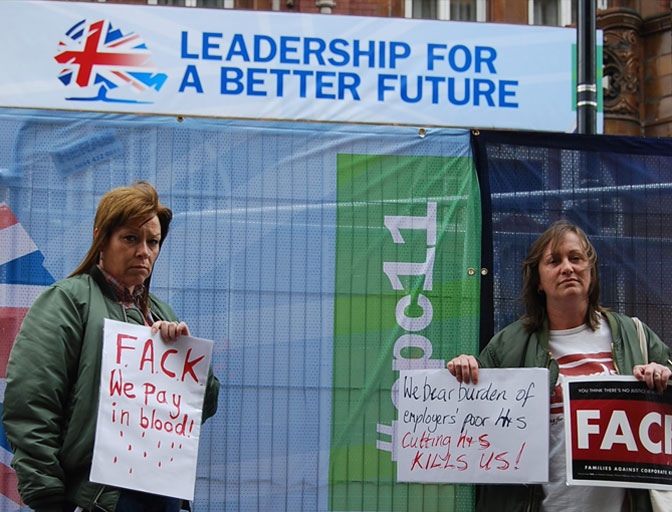
Overkill
Hazards issue 116, October-December 2011
Up to now it has been Tory hawks in government, including the prime minister’s reinstated adviser Lord Young and safety minister Chris Grayling, that have been the most vociferous opponents of safety regulation and enforcement. But it is Nick Clegg who has now taken up the cause of the deregulation obsessed fringes of the business lobby.
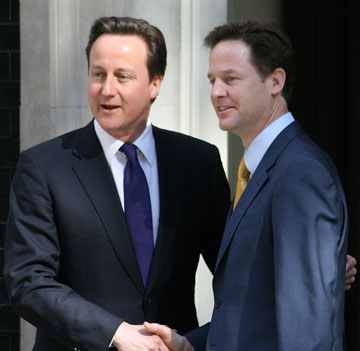
SMUG SHOT Prime minister David Cameron says the economy is wilting in “the shadow of health and safety.” His deputy Nick Clegg has promised to stop HSE inspectors breathing down the necks of business. But dangerous firms have never had less official safety oversight – and the families of Michael Benn, Mitesh Prashar and Alan Winters know this can have devastating consequences [more]
The deputy prime minister told a business conference on 25 October 2011 “there will be a major shake-up of business inspection - going through the regulators, asking ‘are they still necessary?’; ‘Should they still exist?’; making sure that, yes, they intervene when necessary, they offer advice and support, but otherwise they let you get on with it.”
Mr Clegg added enforcement agencies including the Health and Safety Executive (HSE) “will have to make sure they aren’t breathing down your necks. Why, for example, should regulators be able to turn up at your door whenever they want and as often as they want? Why can’t we limit the number of inspections to, say, two a year, ensuring these bodies coordinate amongst themselves to stick within that limit?”
Life threatening cobblers
The union-backed Hazards Campaign accused the deputy prime minister of talking “utter cobblers”. A spokesperson added: “Not only is it cobblers, it is dangerous, toxic, life threatening cobblers.” Safety inspections have already fallen to a rate of once in a working lifetime, the campaign said (Hazards 110). It noted that even before a recent government demand for pro-active HSE inspections to fall by a third, only 1-in-every-19 major injuries reported to HSE was even investigated (Hazards 115).
STOP PRESS A government commissioned report published on 28 November concluded Britain’s workplace safety laws “are broadly right”. But it is being used by the government to attack those laws and to skew the system away from employer responsibility and towards “personal responsibility”. See: Ministers see red tape
Richard Jones, head of policy and public affairs at the safety professionals’ organisation IOSH, was also critical of the Clegg line. “Good health and safety isn’t ‘red tape’ – it saves lives, supports enterprise and sustains the economy,” he said. “It’s important to remember that, sometimes, health and safety inspectors may need to make unannounced visits following serious complaints, concerns, or incidents in order to ensure people’s safety is not being put at risk. This must not, under any circumstances, be impeded.”
Prospect deputy general secretary Mike Clancy said the speech “reinforced the need for a debate informed by facts rather than impression. Far from ‘hounding’ business, numerous reviews of HSE’s activities… have illustrated the high level of support and respect for HSE and its appreciation of commercial reality.” He said with the lifespan of a small business averaging seven years “they are more likely to fail than receive a visit from an HSE inspector.”
In an open letter, Prospect invited Mr Clegg to meet inspectors “and discuss the reality of inspection, or suggest he accompanies an HSE inspector and discovers for himself how far removed their work is from the caricature of an organisation determined to undermine business and any return to prosperity.”
Unite general secretary Len McCluskey also expressed concern. “This red tape cutting exercise is no more than a red herring. Just like the other assaults on workers' rights perpetrated by this government, they will not create one single job. What they will do is put workers at risk and make them less able to speak up against abuse or neglect.”
Do-it-yourself policing
Criticism of the government’s approach has led to a softening of the language, but no meaningful modification of the approach. It wasn’t long after the LibDem leader’s contribution before a Conservative minister was back to put more detail on the government’s blueprint for lawlessness – or self-regulation, as ministers fashion it.
This time it was business and enterprise minister Mark Prisk promising to wield the regulatory axe. In a 1 November 2011 speech to the Local and National Regulators annual conference, Prisk told regulators “when regulation becomes heavy-handed, inefficient, prescriptive and risk-averse it drags down the ability of businesses to grow, prosper and create jobs.”
The minister added: “The challenge is to transform the regulatory landscape so that the system delivers essential protections whilst avoiding unnecessary interference in the day to day work of hard-working business people seeking to innovate and grow and thereby delivering the jobs and wealth we need.”

REAL BURDEN Alan Jr never got to meet his dad, Alan Winters, who was crushed to death at work six weeks before he was born [more]. Mr Winters’ partner, Laurie Swift, features in a ‘Want to know about burdens?’ poster produced by Hazards as part of the We Didn’t Vote to Die at Work campaign.
Prior to and immediately after they won the election, top Tories had talked of introducing a system of ‘earned autonomy’, where firms with better safety records could opt-out of official health and safety inspections. Other ideas included more partnership systems, along the lines of the contentious US voluntary protection programmes scaled back when President Obama came to power.
Conservative and government talk of business self-regulation took a backseat in the months following the banking crisis, where the self-policing approach was widely blamed for the economic catastrophe and persisting downturn that followed.
Prisk brought it back centrestage, proposing more use of “co-regulation, where business shares a degree of regulatory responsibility, for example through industry bodies setting professional and working standards.” Also on the self-regulation wishlist was “‘earned recognition’ – where regulators recognise business activities that support compliance and reduce intervention, creating a stronger incentive for private sector led compliance.”
No-one kills company directors
The prospect of leaving the business of safety to business itself angered RMT general secretary Bob Crow. Commenting as HSE published figures confirming a sharp rise in workplace fatalities [more], he said: “As far as I know, no one ever died from a work-related injury in a company boardroom or on a bankers trading floor. This growing catalogue of workplace deaths shows in graphic detail that the corporate killers are literally getting away with murder.”
TUC general secretary Brendan Barber also expressed concern at the government’s eagerness to hand business a do-it-yourself alternative to safety enforcement. “Enforcement should not be seen as a burden on business, but instead a way of ensuring that good businesses are not undercut by cowboys who disregard the law and cut corners, whether it is on paying VAT or not polluting our rivers. Cuts in enforcement will put even more of us at risk of damaged health or injury or death in our workplaces.”
Referring to the SME Business Barometer, published by Mark Prisk’s ministry in October 2011, Barber added: “A brand new survey of small and medium-sized enterprises published by the Department for Business, Innovation and Skills (BIS), shows that employment law and health and safety regulation do not even feature in their list of concerns. It would appear that employer organisations are pursuing a fanatical right wing agenda that does not actually reflect the concerns of their members.”
It is a message reinforced even in research by business lobby groups. Forum of Private Business (FPB) survey findings published in July 2011 indicated administering tax has become “the top regulatory burden” for small business owners. Tax-related regulation was deemed to be the most costly area of ‘red tape’, leaving smaller employers with a bill of £5.1 billion per year. Employment law was second at £4.2 billion, with by health and safety law trailing at third in the small business grumbles list, at £3.8 billion.
But this doesn’t stop the business lobby clamouring for less regulatory oversight, when faced with a government inviting a Red Tape Challenge and determined to convince all parties red tape and not poor governance is holding back the economy, job creation and business profitability – and singling out health and safety as a culprit in chief.
Obligingly, the more vocal and more extreme outliers of the business lobby, spearheaded by the British Chambers of Commerce, have manufactured a case for change that over-estimates costs of safety regulation and ignores entirely the benefits. These benefits include savings to business in reduced lost time and in keeping skilled workers on the job. The calculation also ignores safety-driven innovation as a job and wealth creator, creating new markets and more efficient work methods. And the business figures also take no account of the human and financial costs of work-related injuries and ill-health borne by the public purse, communities and affected workers.
A right old mess
The determination of ministers to placate this lunatic fringe of the business lobby comes despite overwhelming evidence, including three in three months from the US, [more] that confirms safety regulation and enforcement not only saves lives, it is good for the bottom line. An analysis by thinktank Public Citizen published in August 2011 found five major US workplace health and safety rules, most of which were initially opposed by industry, have saved thousands of lives, prevented tens of thousands of injuries and in at least one case dramatically improved productivity.
A September 2011 report from San Francisco-based Worksafe, which tallied the costs – human, financial, and social – of failing to make work safer, also confirmed ‘prevention pays’ for employers. One company health director cited in the report noted: “It is better to put a fence at the top of a cliff than an ambulance at the bottom. Companies are so bottom-line driven, prevention can be a hard sell, but it is always a better solution.”
And an analysis of a decade’s worth of data on safety inspections, published in October 2011 by the Department of Labor & Industries (L&I) in Washington State, found official workplace safety inspections lead to dramatically reduced injury rates and big savings for firms.
But the UK government’s choice of preferred business bedfellows – those that believe workplace casualties are an unfortunate but sometimes necessary byproduct of a profitable business model - may be explained by evidence the prime minister let a secret right-wing, business-driven deregulatory agenda flourish within the highest levels of his party.
Atlantic Bridge, an organisation created by former defence secretary Liam Fox which was wound up in 2010 following a critical Charity Commission report, worked in partnership with the American Legislative Exchange Council (ALEC), an anti-regulation front organisation for elements of the US business lobby profoundly opposed to regulation and bent on its own programme of industrial militancy to attack it. Workplace safety rules are a top ALEC target. Prior to taking up his post in government, current health and safety minister Chris Grayling was a member of Atlantic Bridge’s advisory board [more].
Cameron’s deadly cynicism exposed
Certainly, any government regard for evidence-based decision making or sensitivity about the pitfalls of leaving business to police its own safety affairs appears to have evaporated. In his 5 October 2011 keynote address to the Conservative Party conference, prime minister David Cameron said “one of the biggest things holding people back is the shadow of health and safety.” This was followed by one of his more widely reported soundbites. “This isn’t how a great nation was built. Britannia didn't rule the waves with arm-bands on,” he said.
It’s the sort of sink-or-swim rhetoric that found favour with early opponents of child labour laws and the factories acts. The deadly cynicism underpinning this approach only becomes apparent when you examine the real-life consequences of Cameron’s quest for a Britannia that waives the rules. Consider just three of the cases – there are many more like them - that came to court in the summer of 2011.
Michael Benn, 37, an employee of maintenance contractor Epsco, drowned in a water filled sump at Connah's Quay Power Station in North Wales. The culvert which led to the sump was poorly lit and there were no safety barriers. HSE principal inspector Colin Mew said: “This incident was entirely foreseeable and yet it was still allowed to happen... The cost of providing barriers or other measures to prevent this incident and the time and effort involved would have been minimal.”
Mitesh Prashar, 24, a night-shift worker with Duco International Ltd, was trapped in a machine and killed. There was no guarding and the firm had failed to provide adequate information, instruction or training. HSE’s Ray Kelly commented: “This needless tragedy is typical of what can happen when health and safety management systems fail. Had the hazards been assessed, the lack of any guarding would have been highlighted, and this death could have been avoided.”
Alan Winters, 28, was crushed to death by a four-ton crate at Sheffield engineering firm DavyMarkham Ltd six weeks before his son, Alan Jr, was born. HSE inspector Carol Downes said the “terrible tragedy” resulted in “the most devastating impact on his partner, Laurie [right] –, and his parents, Kim and Alan. His son will also never meet his dad.” She added: “It was also utterly preventable if proper assessment and planning had been carried out before unloading was attempted” [more].
The retreat from safety regulation and enforcement now has a dedicated government champion. On 25 October 2011, Downing Street announced former Tory Cabinet minister Lord Young had been re-appointed as an adviser to the prime minister on enterprise, indicating he “will work on reducing the burden on business from health and safety regulations, working across departments on the implementation of his recommendations.”
But it wasn’t business burdens that crushed Alan Winters. It wasn’t the shadow of health and safety that caused Michael Benn to drown in darkness. And it wasn’t red tape that mangled the young body of Mitesh Prashar. It was the sort of lawlessness that is becoming a central precept of the government’s approach to safety at work, and which has government ministers queuing to voice their approval. They don’t have to remove the laws to kill you; they just have to make sure business knows no-one will be breathing down their neck when it comes to safety. Cut as many corners as you like, but you’ll not get caught until there is blood on the factory floor.
Safety cuts will mean more injuries
The TUC has warned that cuts in enforcement could lead to an upturn in work-related deaths, sickness and injuries. The union body was commenting after official figures showed a fall last year in work-related ill-health and injuries. The statistics released by the Health and Safety Executive (HSE) on 2 November 2011 show that in 2010/11, 24,726 major injuries were reported by employers, at a rate of 99 injuries per 100,000 workers, compared with 26,268 in 2009/10, at a rate of 104.8.
An estimated 1.2 million people said they were suffering from an illness caused or made worse by their work - 500,000 new illnesses occurring in-year - down from 1.3 million in 2009/10, said the report. The statistics show 171 workers were fatally injured - up from 147 the previous year. Deaths from the asbestos cancer mesothelioma reached a record 2,321 in 2009, according to the report, up from a then record 2,263 in 2008. The toll of injury and ill-health resulted in over 26 million working days being lost, an average of 15 days per case - 22.1 million to ill-health and 4.4 million to injury.
TUC general secretary Brendan Barber commented: “These figures cover the period before government changes to the level of safety inspections were introduced. There is a very real danger that the long term downward trends in injury and illness rates that we have seen over recent years will start rising again, as has happened with fatalities.” He added “the coalition government's retreat from inspection activity is very worrying for the future.”
Campaigners disputed HSE’s headline claim that there has been a “continued fall in workplace ill health and injury.” Hilda Palmer of the campaign group Families Against Corporate Killers (FACK) told Hazards that a fall in reported injuries at a time of rising fatalities “should be ringing alarm bells rather than activating the spin cycle at the HSE.” Job fear was a more likely cause of a drop in reported injuries, she said.
While major injury figures had shown a marked downturn, the 1.3m reporting work-related ill-health did not reflect a ‘continued fall’, but a levelling off at between 1.2m and 1.3m cases for each of the last four years.
Dad-to-be's death exposes safety flaws
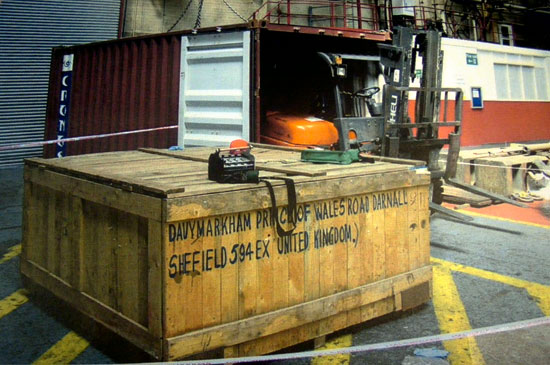
A Sheffield crane driver died from massive crush injuries just weeks before he was due to become a father, a court has been told. Alan Winters, 28, was killed when he and colleagues attempted to unload a four-ton crate from a shipping container at the DavyMarkham Ltd factory in Sheffield, on 15 July 2008.
Sheffield Crown Court was told Mr Winters was one of a group of workers who had already tried several ways to move the crate from the container. In a final attempt, Mr Winters climbed on the back of a forklift truck to unhook a chain from a corner of the container but the forklift reversed too far and tilted up over the lip of the container, trapping him against the roof.
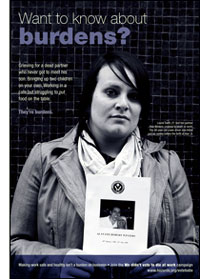 Mr Winters' partner, Laurie Swift (right), was nearly eight months' pregnant at the time and gave birth to their son, Alan Jr, only six weeks later. She and Alan had recently moved into a new home in Sheffield's Littledale estate with Laurie's daughter Leah, then seven.
Mr Winters' partner, Laurie Swift (right), was nearly eight months' pregnant at the time and gave birth to their son, Alan Jr, only six weeks later. She and Alan had recently moved into a new home in Sheffield's Littledale estate with Laurie's daughter Leah, then seven.
The incident prompted a full investigation by the Health and Safety Executive (HSE) and led to the prosecution of DavyMarkham Ltd for a major criminal breach of safety legislation. In August 2011, the firm was fined £33,333 with £49,247 costs. Alan’s distraught mum Kim, 52, said the fine was ‘a load of rubbish’.
HSE inspector Carol Downes said: “This was a terrible tragedy. Mr Winters' death had the most devastating impact on his partner, Laurie, and his parents, Kim and Alan. His son will also never meet his dad.” She added: “It was also utterly preventable if proper assessment and planning had been carried out before unloading was attempted. None of the managers or supervisors thought to stop the work until a risk assessment was done or safe procedure found.”
US studies show regulations save lives and money
Three new US studies have shown that businesses as well as workers and communities benefit when workers are properly regulated and those regulations are properly enforced.
An analysis by thinktank Public Citizen found five major US workplace health and safety rules, most of which were initially opposed by industry, have saved thousands of lives, prevented tens of thousands of injuries and in at least one case dramatically improved productivity. It challenges arguments put by the US business lobby, which has ramped up its efforts to gut the USA’s regulatory system. Public Citizen says these corporate interests claim that rules are burdensome and costly, but they fail to acknowledge that the rules have benefits. Regulations often yield enormous advantages, sometimes at minimal costs to industry, Public Citizen’s analysis found.
The five major worker health and safety rules outlined in the ‘Regulations at work’ report include a rule requiring the cotton industry to reduce dust in textile factories. This lowered the prevalence of brown lung disease by 97 per cent in the first five years. In addition, when factories upgraded their equipment to comply with the rule, they found the new machines were seven times faster than the old ones.
A rule requiring manufacturers to place locks and warning labels on powered equipment continues to prevent 50,000 injuries and 120 fatalities per year. Another rule on excavations at construction sites has reduced the fatality rate from cave-ins by 40 per cent. The report also points to a standard for grain-handling facilities that reduced the number of fatalities caused by dust-related explosions by 95 per cent. Finally, a mine safety standard and a law instituting inspections in coal mines led to a rapid 50 per cent decrease in the coal mine fatality rate.
“Corporate interests love to bash regulations in the abstract, so it is important that we recognise the benefits that we – the public – enjoy from particular safeguards,” said Justin Feldman, worker health and safety advocate with Public Citizen’s Congress Watch division. “These are rules that keep us healthy and keep our friends and family members alive.”
In a second report, an analysis of a decade’s worth of data on safety inspections by the Department of Labor & Industries (L&I) in Washington State found official workplace safety inspections lead to dramatically reduced injury rates and big savings for firms. Researchers with the Safety and Health Assessment and Research for Prevention (SHARP) programme, L&I's research unit, examined L&I inspection data and workers' compensation claims from 1998 through 2008. The study found significant reductions in claims and claim costs following an official safety inspection or safety consultation. Under the US system, a company’s insurance premiums are related to injury rates in its workplace.
The SHARP researchers found the greatest impact came when an inspection resulted in at least one citation for a safety breach. In those cases, the research found a reduction in worker injury claims of as much as 20 per cent over similar work sites that were not inspected. The authors say their study bears out what other researchers around the country have found and what SHARP researchers have seen in previous annual reviews of the data. “Safety is not always at the forefront of an employer's mind. But when a significant event takes place, like a serious injury or an L&I inspection, it can really get their attention,” said SHARP director Barbara Silverstein. “This can lead to a greater recognition of what can be done in the workplace to reduce hazards, itself leading to safer workplaces and fewer injuries.”
A third report has confirmed there’s a big pay off for employers when they make work safer. ‘Prevention pays: Solutions to help workers and businesses thrive,’ published in September 2011 by San Francisco-based Worksafe, tallies the costs – human, financial, and social – of failures to protect workers’ health and safety on the job. The report notes: “It’s time to shift from a focus on ‘the problem’ and how bad it is, to a prevention framework that emphasises solutions and ‘fixing’ problems. It’s time to make the goal clearer by using the word ‘prevention’ instead of ‘controls’. It’s time to use the word ‘health’ along with ‘safety.’ It’s time to make the rewards of prevention more consistent, wide-ranging, and initiated by more employers and workers.”
One company health director cited in the report noted: “It is better to put a fence at the top of a cliff than an ambulance at the bottom. Companies are so bottom-line driven, prevention can be a hard sell, but it is always a better solution.”
Regulations at work: Five rules that save workers’ lives and protect their health, Public Citizen, August 2011. www.citizen.org
The effect of DOSH enforcement and consultation activity on the compensable claims rates in Washington State, 1999-2008, Washington State Department of Labor and Industries, October 2011. www.lni.wa.gov
Prevention pays: Solutions to help workers and businesses thrive, Worksafe, September 2011. www.worksafe.org
Safety minister was part of Fox’s organisation
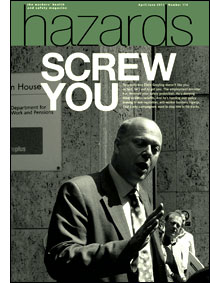 Health and safety has been sucked into a scandal which has seen the prime minister accused of letting a secret rightwing, business-driven deregulatory agenda flourish within the highest levels of his party. Atlantic Bridge, an organisation created by former defence secretary Liam Fox which was wound up last year following a critical Charity Commission report, formed a partnership with an organisation called the American Legislative Exchange Council (ALEC).
Health and safety has been sucked into a scandal which has seen the prime minister accused of letting a secret rightwing, business-driven deregulatory agenda flourish within the highest levels of his party. Atlantic Bridge, an organisation created by former defence secretary Liam Fox which was wound up last year following a critical Charity Commission report, formed a partnership with an organisation called the American Legislative Exchange Council (ALEC).
Like ALEC, Fox’s organisation had heavy representation from business lobbyists and lawyers, many linked to the energy industry. Both organisations pursued a strongly deregulatory agenda. ALEC has made US health and safety and employment laws key targets. Liam Fox chaired the UK charity’s advisory board, which until the election also included current health and safety minister Chris Grayling, the architect of a UK health and safety strategy that has seen the Health and Safety Executive’s (HSE) budget slashed, inspections dramatically curtailed and safety regulations targeted, mirroring proposals in Bills put forward by ALEC.
Campaign group Families Against Corporate Killers (FACK) said it found the revelation the current safety minister had played a board-level role in Atlantic Bridge “deeply concerning”. A FACK letter signed by bereaved relatives noted: “That this government is meeting primarily with corporate lobbyists for deregulation and slashing enforcement as a false ‘burden on business’, rather than listening to the deadly effect of unrestrained business bad behaviour on ordinary people is no surprise to Families Against Corporate Killers.”
It said FACK members were “terrified” by the prospect of increased deaths at work as a consequence of deregulation of health and safety. “We have asked Chris Grayling at the Department of Work and Pensions to meet us but he has refused three times. However, he has managed to find time to meet all the main corporate lobbies: CBI, British Chambers of Commerce, Chemicals Industry Association, the EEF, the Alliance of Industry Association, the NFU, The UK Contractors Group, The Environmental Services Association, the Association of British Insurers and Zurich.”
Ministers see red tape
 A government commissioned report that concluded Britain’s workplace safety laws “are broadly right” and which found “little evidence” they are “goldplated” is being used by the government to attack those laws and to skew the system away from employer responsibility and towards “personal responsibility”. The government response has been condemned by unions as a ruse to “smuggle in” changes it had planned anyway, regardless of the report’s findings.
A government commissioned report that concluded Britain’s workplace safety laws “are broadly right” and which found “little evidence” they are “goldplated” is being used by the government to attack those laws and to skew the system away from employer responsibility and towards “personal responsibility”. The government response has been condemned by unions as a ruse to “smuggle in” changes it had planned anyway, regardless of the report’s findings.
Responding to the Löfstedt report, the government said it would begin “a major cut back of health and safety red tape as early as January” and “will begin an immediate consultation on the abolition of large numbers of health and safety regulations and intends to have removed the first rules from the statute book within a few months.” It says “health and safety regulations will be reduced by a third rising to over a half over the next 3 years, through combining, simplifying and reducing the approximately 200 existing regulations.”
These measures were not called for in Professor Ragnar Löfstedt [above] recommendations, which found instead there is “no case for radically altering health and safety legislation”. The government also said from 1 January 2012 it will establish a new “challenge panel”, another measure going beyond anything recommended by Löfstedt. Ministers say the panel “will allow businesses to get the decisions of health and safety inspectors overturned immediately if they have got it wrong.”
The government’s intention to go well beyond the recommendations of the report were confirmed on 29 November 2011 in chancellor George Osborne’s Autumn Statement, in which he stated the government “accept the recommendations of Professor Löfstedt’s review of health and safety regulation and look to go further as part of the Red Tape Challenge.”
Employment minister Chris Grayling, speaking at the launch of the review findings, said the government would “ensure our reforms put an emphasis on personal responsibility,” adding the government would implement the report’s most controversial recommendation, to exempt self-employed workers from health and safety law where their work “poses no potential risk of harm” to others.
“By accepting the recommendations of Professor Löfstedt we are putting common sense back at the heart of health and safety,” the minister said. “Our reforms will root out needless bureaucracy and be a significant boost to the million self-employed people who will be moved out of health and safety regulation altogether.” The review was commissioned by the government in March, but with a remit limited to making recommendations on reducing health and safety burdens on business.
Unions condemned government proposals to remove over a third of Britain's health and safety regulations as part of a raft of legal reforms planned for 2015. Mike Clancy, deputy general secretary of the Health and Safety Executive (HSE) union Prospect, said: “The government has clearly not got what it wanted from Löfstedt, and has now stated that its efforts will not stop with the actions outlined in the professor's report. The government's announcement of challenge panels from January 2012 is an example of it choosing to use the scope of a policy review to smuggle in other reforms without consulting.”
He added: “It is not regulation but non-compliance and poor interpretation of the rules by employers that should be the government's greatest concern. It must not use these findings to blame workers in situations where their employer is at fault, or to justify any idea that health and safety is a burden on business.”
Unite said it detected “a desire from government for ‘a mosaic of erosion’ in long-established health and safety legislation under the cloak of cutting alleged ‘red tape’.” In comments echoed by campaign groups including the Hazards Campaign and Families Against Corporate Killers (FACK), Unite general secretary Len McCluskey said: “Under the spurious cloak of cutting alleged ‘red tape’ for employers, the government is set to embark on a series of changes that will endanger the lives and health of the 29 million Britons in the workplace. Ministers want to take workplace safety back to Victorian times and tip the legislative balance away from employees in favour of those employers who put cost-cutting and the pursuit of profits first and safety in the workplace second.”
The Unite leader added: “This disturbing trend must be resisted – and Unite will be in the forefront of that struggle in the workplace and in parliament.” RMT union general secretary Bob Crow said: “In the rail, shipping and offshore industries, health and safety isn't some sort of joke to be ridiculed by Tory MPs, it's a lifesaver. The ConDem government seems determined to give bad bosses a licence to kill.”
The TUC has welcomed the Lofstedt report's conclusion that the UK's health and safety laws “are broadly right”, but it says it has major concerns that the proposals to exempt some self-employed workers could have a “devastating impact” on their safety. The union body is also disappointed that the report makes no suggestions as to how the protection of employees in the workplace could be improved.
Commenting on conclusions of the government-commissioned report, TUC general secretary Brendan Barber said “Professor Lofstedt was only asked to look at the 'burden' on business, not the burden that the failings in the current system have placed on the two million people whose health has been made worse because of their work. Nor has it considered the more than 20,000 people whose lives are cut short every year as a result of a preventable work-related injury or illness. Because of this, not one life will be saved as a result and not one injury or illness prevented. This is very much a missed opportunity.”
The union leader also expressed concern at the proposal to remove up to one million self-employed workers from the protection of current safety laws. “These people, who often work in the most dangerous of jobs, are already much more likely to be killed or injured. There is little doubt that removing the self-employed from the regulations will increase their risk of illness and injury and lead to a rise in the number of bogus self-employed in sectors like construction,” he said.
“While we welcome comments in the report on the need to address the major occupational health problems in the UK and to support union safety representatives, it is regrettable that no recommendations have been made on how to go about doing this. It is time the government stopped tinkering around with regulations to save business from non-existent 'red-tape' and instead started looking at what positive steps it could take to improve Britain's health and safety record.”
Reclaiming health and safety for all: An independent review of health and safety legislation, report of the Lofstedt Review [pdf] and the government response [pdf]
Overkill
The government is hell bent on removing workplace safety protections. It’s an obsession that will kill.
Contents
• Introduction
• Life threatening cobblers
• Do-it-yourself policing
• No-one kills company directors
• A right old mess
• Cameron’s deadly cynicism exposed

RED MIST Ministers love their friends in business, and their friends in business hate health and safety. So the government intends to go way beyond the recommendations of the official review of workplace safety it commissioned from Professor Ragnar Löfstedt [above]. The professor found Britain’s safety laws are “broadly right”.
See: Ministers see red tape
Related stories

Dad-to-be's death exposes safety flaws more
Safety cuts will mean more injuries more
US studies show regulations save lives and money more
Safety minister was part of Fox’s organisation more
Hazards webpages
Vote to die • Deadly business